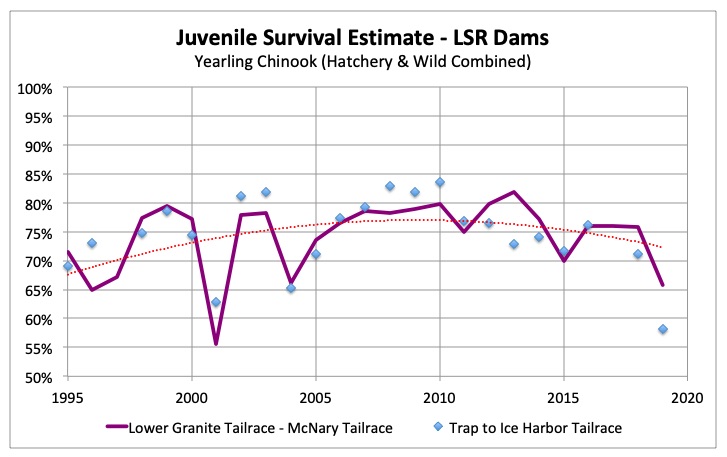forum
library
tutorial
contact

New Study on Dam Breaching
Hits the Mark
by Editorial Board
Walla Walla Union-Bulletin, August 6, 2020
|
the film forum library tutorial contact |

|
New Study on Dam Breaching
by Editorial Board
|
A new federal study, which has taken four years to prepare, backs our stand.
 Tearing down the four Snake River dams as a way to save salmon would likely yield little benefit for the fish but would be an economic disaster for the Pacific Northwest.
Tearing down the four Snake River dams as a way to save salmon would likely yield little benefit for the fish but would be an economic disaster for the Pacific Northwest.
That's been our position on the issue of dam breaching for decades. The water from a free-flowing Snake would flood farms, roadways, homes and more.
(bluefish notes: The Final EIS repeatedly makes the point that Lower Snake River dams do NOT provide flood control.)Yet, the political debate continues as some believe even minor gains in restoring the salmon population is worth the chaos created by breaching.
A new federal study, which has taken four years to prepare, backs our stand.
The study rejects calls to breach the four lower Snake River dams.
Instead, it recommends spilling more water over dams in the Columbia River hydrosystem, which includes Snake River dams, in the spring to help juvenile fish heading downstream, according to the Tri-City Herald.
The study was ordered by U.S. Judge Michael Simon in Portland over concerns that not enough was being done to protect endangered or threatened fish species in the Snake and Columbia rivers.
This is not the first federal study that's been done -- the most recent was in 1995 -- and it likely won't be the last.
After all, this study -- prepared by the U.S. Army Corps of Engineers, the Bureau of Reclamation and the Bonneville Power Administration -- has already been condemned by environmental groups and fishing interests.
But this issue can't be looked at in a vacuum. The economic and social consequences are critical and must be weighed in every decision.
For example, the generation of clean, efficient and cheap electricity would be reduced. That's bad for the environment and our bank accounts. Hydropower is a renewable resource.
Northwest RiverPartner, a group representing utilities, farmers and businesses interests, as well as other supporters of maintaining the dams, contend that if they are removed the region's carbon footprint would be increased, as goods now barged on the river would be moved by train and truck.
Given that, and many other negative economic and social impacts, the prudent course would be to follow the recommendations of the new study.
Not only does the study call for more water to be spilled over the dams but an even greater investment in habitat restoration to help threatened and endangered fish.
Northwest RiverPartners said it hoped that the new environmental study would bring closure to the issue of breaching lower Snake River dams.
That's not going to happen. The political battle will rage on.
However, the study -- rooted in reality -- provides a solid foundation to move forward with efforts to help salmon while not undercutting the Northwest's economy.
learn more on topics covered in the film
see the video
read the script
learn the songs
discussion forum
